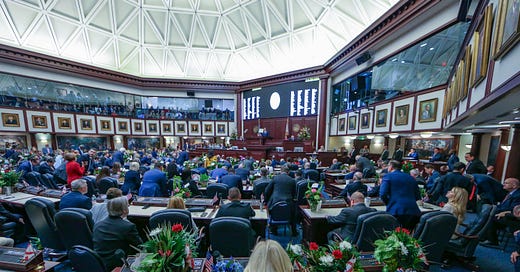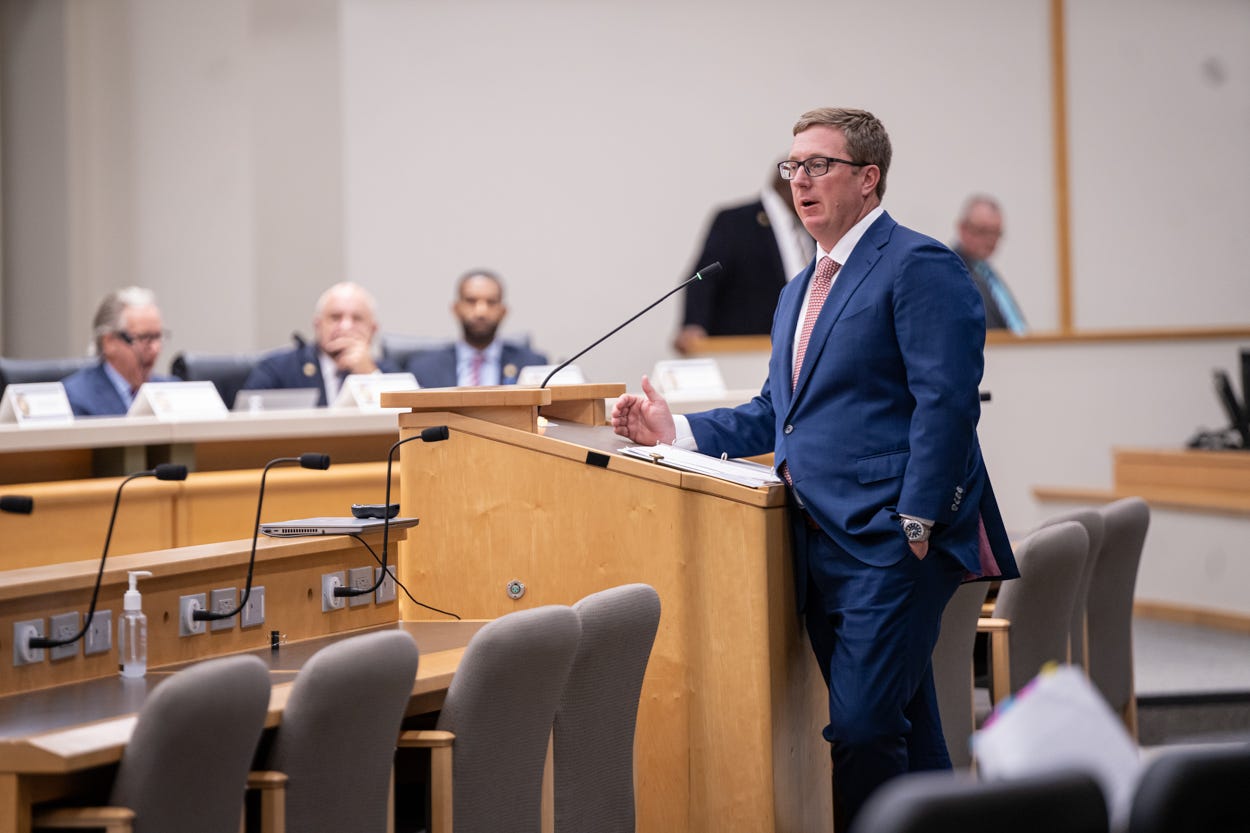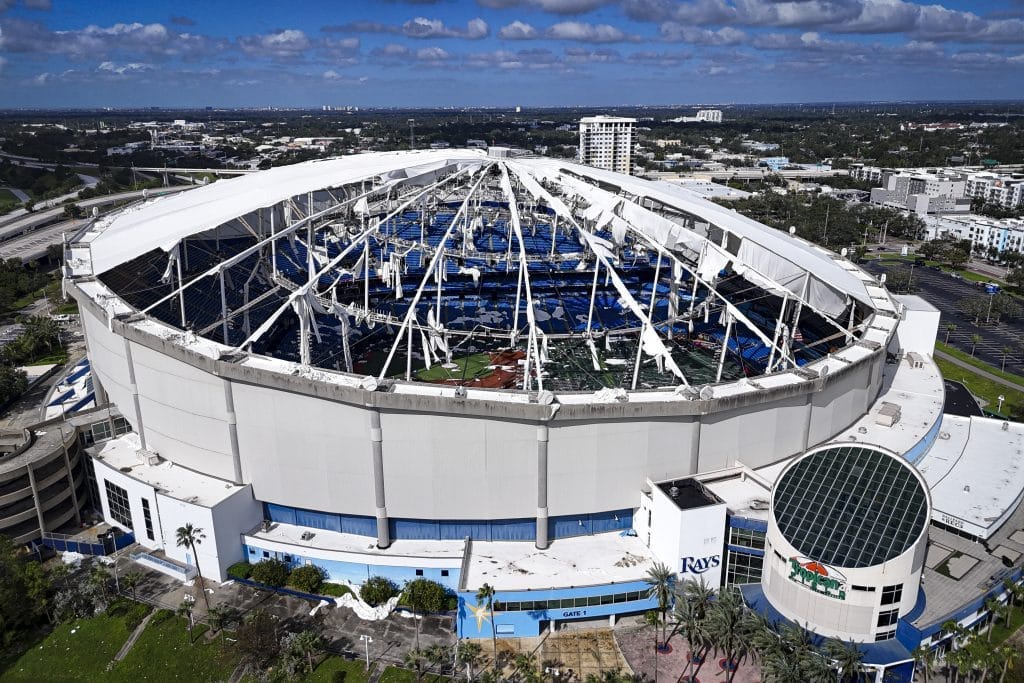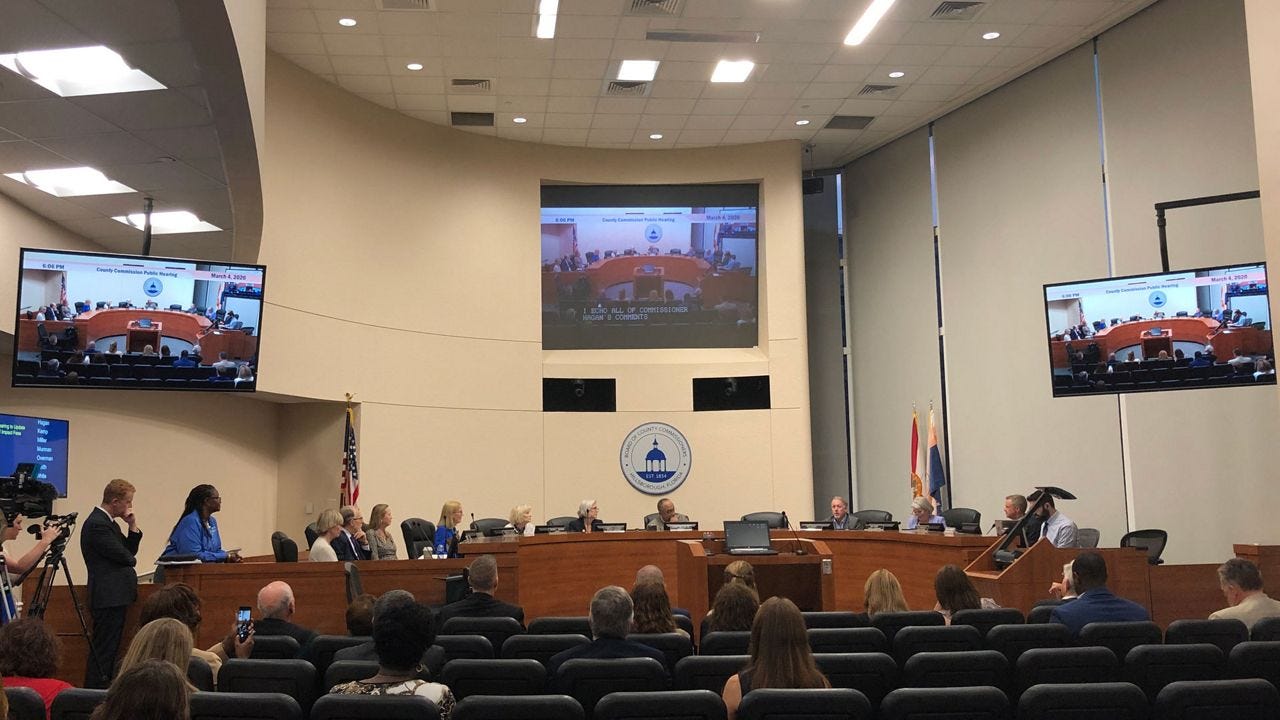Florida Budget Battle: Lawmakers Split Over $4.4 Billion Shortfall & DeSantis Administration's ‘Questionable’ Spending Under Scrutiny
April 7, 2025 - This Week's News from Central Florida
Welcome to this week’s edition of the Central Florida Times, an independent, reader-supported newsletter focusing on the Sunshine State. These are the most important stories you need to know from across Central Florida. To never miss an update, subscribe here:
Here’s the latest from Central Florida…
Florida Legislature Divided Over $4.4B Budget Gap
At the midpoint of the 2025 legislative session, Florida’s House and Senate are sharply divided over the state budget, with a $4.4 billion gap separating their proposals. The House has pitched a nearly $113 billion budget, while the Senate plan totals $117.4 billion. Both fall below this year’s $118.6 billion budget, as lawmakers debate cuts, tax relief, and funding priorities. Key differences include pay for state workers—the Senate offers a 4% raise, while the House includes no increases. The House’s budget plan also calls for the elimination of 7,000 vacant state government positions, while the Senate cuts only 1,000. House Speaker Daniel Perez (R-Miami) proposes to slash $5 billion in sales taxes, favoring broad tax relief over increased program funding. That idea would include a permanent 0.75% sales tax reduction, but Governor Ron DeSantis wants a reduction of property taxes, even proposing to eliminate them altogether via a future constitutional amendment. Senate President Ben Albritton (R-Wauchula) has urged caution on both proposals, instead favoring a temporary one-year tax relief measure for now. Education is another flashpoint. Both chambers would boost school funding, but differ on bonuses for students passing advanced courses like AP and IB. Students and educators have pushed back against the proposed cuts over concerns of reduced academic opportunities. The House also seeks to redirect $834 million from environmental and affordable housing programs to general revenue, undoing recent legislative deals. To resolve these differences, lawmakers must reconcile their budgets before fine-tuning the final spending plan. “We must remove the temptation to spend,” insisted House Budget Chair Lawrence McClure (R-Dover), while Senate leaders stress the need to balance austerity with critical services. The Florida Legislature is required to pass the General Appropriations Act annually, and a 72-hour "cooling-off period" must be observed before voting on the budget. The final budget must be printed and available to members by April 29 to meet the May 2 adjournment deadline
Florida Lawmakers Probe ‘Questionable’ Spending Under DeSantis Administration
Lawmakers in the Florida State House are ramping up scrutiny of state agencies under Governor Ron DeSantis’ administration, issuing formal demand letters to probe potentially wasteful spending. The inquiry, led by Speaker Daniel Perez (R-Miami), cites a lack of cooperation and unanswered questions about government spending. The House Budget Committee recently approved taking action as part of a broader push to ensure fiscal accountability and eliminate wasteful expenditures ahead of finalizing the 2025-2026 state budget. Budget Chairman Rep. Lawrence McClure (R-Dover) stressed the need for transparency and better data to safeguard taxpayer funds amid financial inconsistencies. Letters requesting records will be sent to multiple agencies, including the Division of Emergency Management, Department of Management Services, Department of Corrections, and Agency for Health Care Administration. Lawmakers voiced concerns ranging from unaccounted-for vehicles, six-figure salaries for out-of-state employees, unauthorized pay raises, and $35 million in interest paid on an unfinished mental health facility. They also question the billions spent on disaster response and lament that previous oversight attempts were “stonewalled.” The committee also signed off on a measure to create a new "Florida Accountability Office" to enhance legislative oversight of state agencies. The inquiry into the DeSantis administration’s spending has deepened tensions between the Republican-controlled House and the governor, with disagreements over tax policy and governance priorities adding to the friction. Gov. DeSantis has sharply criticized the House publicly in recent weeks for expanding bureaucracies and failing to adhere to the "Florida model" of governance. He accused lawmakers of joining forces with Democrats to increase spending on unnecessary initiatives and projects. However, House budget chief Rep. McClure emphasized that the House's inquiry into spending is not directed at the governor but rather prioritizes the interests of Florida taxpayers.
St. Petersburg Approves $22.5M for Tropicana Field Roof Repairs
The Tampa Bay Rays are one step closer to returning to Tropicana Field after the St. Petersburg City Council approved $22.5 million for a new roof. The funding, passed in a 7-1 vote, follows damage from Hurricane Milton, which tore through the stadium's teflon-coated fiberglass roof. That amount will help cover nearly half of the estimated $55.7 million needed for full repairs, with additional interior fixes still pending. The city is contractually obligated to make the repairs under its lease with the Rays, despite the team signaling long-term plans to relocate. Team president Brian Auld praised the decision, stating the club is preparing for its return in time for Opening Day 2026. A recent $1.3 billion stadium deal in St. Pete collapsed, and it remains increasingly likely the team’s future home will be outside of the city. The Rays plan to return to Tropicana Field in 2026, remaining through 2028. The 2025 baseball season will be played at Steinbrenner Field in Tampa–the Spring Training home of the New York Yankees. As the Rays’ future is uncertain, fans and officials alike remain frustrated. On Opening Day, chants of "sell the team" filled the stadium, echoing sentiments reportedly shared within MLB leadership toward owner Stuart Sternberg.
Central Florida Loses $735M in Critical Funding After Congressional Vote
More than three-quarters of a billion dollars earmarked for community projects in Central Florida were eliminated after Congressional Republicans voted to scrap local funding as part of a broader effort to avert a federal government shutdown. This included 133 local projects across the 11 congressional districts that cover Central Florida, which were halted after the federal funding was omitted from the stop-gap spending bill passed by lawmakers in mid-March. That continuing resolution left out over $94 million in funding for storm resilience and sustainability projects. Many of these projects were located in Tampa Bay, which would have supported recovery and resilience efforts after back-to-back hurricanes in 2024. The City of St. Petersburg was set to receive one of the region’s largest allocations for this purpose. At $9 million, Rep. Anna Paulina Luna (R-FL) sponsored the Bartlett Lake/Salt Creek Pump Station construction that would alleviate flooding challenges for the areas near Lake Maggiore. The partisan fight over federal spending forced Republicans to defend their vote as necessary to ensure fiscal responsibility and avoid a halt to federal operations. All but one Republican in the U.S. House voted for the stopgap measure. Meanwhile, Democrats accused their colleagues across the aisle of prioritizing tax cuts for the wealthy over local needs. “Everything is about paring back government services to fund billionaire tax giveaways,” said U.S. Rep. Kathy Castor (D-FL). Beyond storm hardening and flood mitigation, the cuts impacted everything from infrastructure repairs and transit improvements to public safety and cancer research. Local officials plan to seek alternative funding sources for many of the now-canceled projects, potentially examining city bonds or utility rate increases. However, other initiatives remain uncertain as Congress debates future budgets and questions circulate about whether community-focused funding will return in next year’s negotiations.
Activists Urge St. Pete to Consider Public Utility Over Duke Energy
Activists in St. Petersburg are urging city leaders to explore alternatives to Duke Energy as the utility’s 30-year franchise agreement nears renewal in 2026. At a town hall hosted by the “Dump Duke” campaign, speakers outlined the benefits of creating a city-run utility, emphasizing local control and potentially lower electricity bills. Council member Richie Floyd encouraged residents to push for a feasibility study, similar to Clearwater’s $500,000 effort to evaluate public power options. Duke Energy has faced criticism for recent rate hikes, including a base rate increase and monthly surcharges tied to hurricane recovery costs. Activists pushed back on the fairness of repeated charges for grid repairs, channeling the growing dissatisfaction with investor-owned utilities in Florida. In response, Duke Energy defended its commitment to reliability and clean energy initiatives, stating that its service to St. Petersburg would continue regardless of the franchise agreement’s renewal.
Hillsborough County Approves Creation of DOGE Committee
Hillsborough County commissioners have voted 6-1 to establish a Department of Government Efficiency (DOGE) Liaison Committee, aligning with similar state and federal efforts to review government spending. The advisory committee will examine county expenditures and recommend cost-saving measures. The committee, modeled after a process initiated by former President Donald Trump and later adopted by Gov. Ron DeSantis, will meet monthly for up to a year. It will provide regular updates and issue a final report unless extended by the board. Republican Commissioner Christine Miller, who led the proposal, said she collaborated with the governor’s office on the effort, noting state officials are monitoring local implementation efforts. The five-member committee will consist of Hillsborough residents with expertise in accounting, finance, IT, or related fields.
Pinellas County Approves $24M for Tourism Projects
Pinellas County commissioners have approved more than $24 million in tourist development tax funding for five tourism projects aimed at enhancing the county's attractions and boosting economic growth. The projects were scored on their long-term tourism impact, visitor projections, alignment with the county’s strategic plan, geographic distribution, and marketing/sponsorship benefits, among other factors. Here’s how each location plans to use the money:
Eddie C. Moore Complex (Clearwater)
Clearwater’s softball facility will receive $7.75 million for upgrades, including a two-story multipurpose building with restrooms, broadcasting areas, and expanded seating. The renovations aim to increase attendance from 129,000 to 150,200 annually and boost revenue from $61.6 million to $81.9 million over a decade. Awarded $7.75 million for renovations and a new two-story multipurpose building with restrooms, event spaces, and broadcast areas.
Clearwater Beach Municipal Marina
Approved for $7.85 million to enhance accessibility, upgrade infrastructure, and build a pedestrian-friendly “marina walk.” Visitor numbers are projected to reach 1.2 million, estimating revenue of $304 million in the 10 years following redevelopment.
Palladium Theater (St. Petersburg)
Granted $2.5 million for interior upgrades, such as lighting, seating, and acoustic improvements. Projected tourist tax revenue could increase from $88,700 to $242,200 annually. Attendance could rise from 67,000 to 94,500 annually within 10 years.
Clearwater Marine Aquarium
Funding $6 million in renovations to its “Winter Zone,” transforming the space into sea lion and otter habitats while improving accessibility. The project is expected to help double annual attendance to 223,600, with tourist tax revenue doubling to $3 million.
Arts Center & Chihuly Collection (St. Petersburg)
The arts hub received $2.25 million toward a new five-story facility combining the Morean Arts Center and Chihuly Collection. Though it ranked lowest in evaluations, the project was awarded increased funding after commissioner discussion. Estimated 10-year growth in attendance could reach 83,300 with tax revenue climbing to $267,200 annually.
Universal’s Epic Universe Looms Over Walt Disney World
As Universal Orlando prepares to open its highly anticipated May opening of its Epic Universe theme park, The Walt Disney Company is strategically responding with a significant $60 billion investment in its parks over the next decade to maintain its competitive edge. Epic Universe–just nine miles away–will feature attractions like high-speed coasters and thrill rides that target an older audience of teens and young adults, setting the stage for an intensified Central Florida theme-park rivalry. To counter this, Disney is planning a series of new attractions, shows, and experiences, with a continued focus on family-friendly entertainment. Starting this year, the Happiest Place on Earth is unveiling refreshed classic attractions, including a reimagined Test Track at Epcot and an overhaul of Buzz Lightyear’s Space Ranger Spin, slated to reopen in 2026 at Magic Kingdom. Disney is also striving to further their appeal to families by offering discounted children’s tickets, enhanced hotel perks, and more character experiences. As the company faces growing concerns about affordability at its theme parks, Disney executives are responding to the criticism that soaring prices have made their parks less accessible to their core audience. This summer, Disney is rolling out deals for families, such as 50% off kids’ tickets for three-day stays, an $89-per-day three-park pass, and free dining for four-day hotel bookings. Interactive kids' zones and character engagements at Epcot, Magic Kingdom, and resort properties aim to further increase the company’s appeal to younger guests. Looking ahead, Disney has outlined long-term expansion plans to create entirely new experiences. Magic Kingdom will see the addition of a Villains-themed land, while Frontierland will welcome two new attractions based on the Cars franchise. Animal Kingdom is set to introduce an Indiana Jones-themed attraction and an area inspired by the film Encanto. At Hollywood Studios, Muppetvision 3D will be replaced by a new ride based on Monsters, Inc., and the Rock ‘n’ Roller Coaster is slated to be rebranded with the Muppets’ Dr. Teeth and the Electric Mayhem. Disney’s parks division generated $34.2 billion in revenue last year, making it the company’s strongest performer. With significant changes on the horizon, the entertainment giant is betting on a mix of nostalgia, value-driven promotions, and new family-oriented experiences to maintain its dominance.
Thanks for reading this edition of the Central Florida Times. To never miss an update, subscribe for free:
In the meantime, if you learned something or found this read interesting, please consider sharing it to grow our community!










